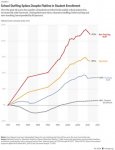That's pretty easy to answer, so let's start naming the issues:
1.) The United States doesn't take teachers seriously, but they do take administrators seriously. As such, administrators and members of the School Boards/Boards of Education --many of whom have never taught a day in their lives-- make a majority of the important decisions. Power is centralized, and so teachers are just cogs in the machine. That does two things; one it creates very stupid academic initiatives --at the local, state, and Federal level-- and stupid educational policies; two, it demoralizes teachers and doesn't incentivize them to do a good job. Confer to Finland, which has the top public education system in the world; the choice there was to do the opposite: Strengthen the power of teachers (in both pay and institutional power) and weaken administrators. The results speak for themselves.
I agree with a lot of what you are saying here, the power is far too distant, too centralized. We should not have a Federal Department of Education, funding from the national government skews things far too much for such little investment, generally spent on the wrong things.
School systems nationwide are also continuously jumping on the newest educational fad bandwagon, changing every three to five years for the newest shiny thing. Teachers are forced to jump through the new hoops, whether they are already effective teachers or not, becoming more and more cookie cutter type automatons sucking any creativity from them, which in turn is passed on to the students who become increasingly bored with teachers forced to be like every other teacher. Constant measuring of every metric to the point where teachers have little time to plan for their classes and are already expected to do much of the grading at home. Hits to teacher morale are incessant.
All the crutches currently in place do more harm, long run, than the intended good. IEPs, Individualized Educational Plans in which teachers are forced to provide notes for the students, give extra time on tests and quizzes, water down certain tests, assignments etc... for the students that have the IEPs creating a system which is not fair to the other students who have to take their own notes, a skill that should be required in any event...
Often, due to the administrative positions being political positions, discipline takes a hit because principals dont want too many parent complaints downtown. Where the rubber meets the road, in the classroom, teachers are often left with little or no real support and have to make their way, especially in difficult class settings, on their own. High turnover with inexperienced teachers who cannot control classes. Students who have not been managed properly in the past know and game the system... they know there will be few true consequences from administration or teachers that fear for their jobs. Student grow accustomed to feeling they do not have to follow the rules or instruction. With discipline lax, frustration is high, freedom to teach how your want curtailed, it becomes a stifling environment. Teachers are constantly walking on eggshells with all the constant briefing on what you cannot do in case [you might offend or embarrass someone]. Lawyers come into the schools before school starts in the fall to brief teachers on the potential law suit worthy pitfalls they might easily fall into.
You add to that the constant watering down of the curriculum so that its not too too hard so everyone can pass, yet getting critiqued if you have too many students with high grades in your classes, it is very epitome of catch 22 at all times from all angles.
Tracking, which has a bad name, has also been pretty much disbanded. So a teacher instead of having a class with mostly the same level of students wherein if you detected students not understanding you could pretty much be assured the whole class wasn't and you could adjust, go back and reteach. Now, you get a smorgasbord of students with skills all over the spectrum. So if you teach slowly to the ones that are not as sharp, you are losing the smart kids who are bored to death. If a teacher goes the other way, teaches to the top end you lose the ones at the bottom who just are unable to keep up, so teachers tend towards the dull middle area.
Middle schools in Central Florida do not give much or any homework, so kids get to high school ill equipped for even modest rigor. HS is preparing for college where you better learn to do the outside reading. So kids arrive at high school with bad habits and no real desire to overcome these habits.




